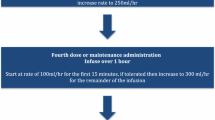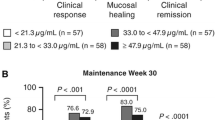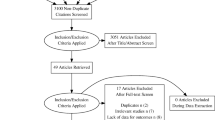Abstract
We sought to determine prescribing patterns and awareness of adverse drug reactions to infliximab among gastroenterologists. A questionnaire was developed and mailed to all gastroenterologists in Maryland and Washington, D.C. Ninety-six of 336 (28.6%) gastroenterologists responded; 86% of respondents use infliximab often or sometimes and 48% infuse infliximab on-site. Only 48% of respondents use immunomodulators prior to infusing infliximab. Thirty-three percent of respondents do not prescribe maintenance infliximab. Respondents reported that infusion reactions occur in 12.9% of infliximab infusions. Most respondents order a purified protein derivative prior to starting infliximab. Respondents underestimated the risk of serious infection, death, demyelinating diseases, and malignancy and overestimated the risk of congestive heart failure. We conclude that a substantial number of gastroenterologists underutilize immunomodulators and fail to prescribe maintenance infliximab. Further, respondents were unaware of the frequency of major adverse events associated with infliximab. Education regarding treatment algorithms in CD and infliximab-related side effects is needed.


Similar content being viewed by others
References
Loftus EV, Jr., Silverstein MD, Sandborn WJ, et al. (1998) Crohn's disease in Olmsted County, Minnesota, 1940–1993: incidence, prevalence, and survival. Gastroenterology 114(6):1161– 1168
MacDonald TT, Hutchings P, Choy MY, et al. (1990) Tumour necrosis factor-alpha and interferon-gamma production measured at the single cell level in normal and inflamed human intestine. Clin Exp Immunol 81(2):301–305
Murch SH, Braegger CP, Walker-Smith JA, et al. (1993) Location of tumour necrosis factor alpha by immunohistochemistry in chronic inflammatory bowel disease. Gut 34(12):1705–1709
Targan SR, Hanauer SB, van Deventer SJ, et al. (1997) A short-term study of chimeric monoclonal antibody cA2 to tumor necrosis factor alpha for Crohn's disease. Crohn's Disease cA2 Study Group. N Engl J Med 337(15):1029–1035
Present DH, Rutgeerts P, Targan S, et al. (1999) Infliximab for the treatment of fistulas in patients with Crohn's disease. N Engl J Med 340(18):1398–1405
Hanauer SB, Feagan BG, Lichtenstein GR, et al. (2002) Maintenance infliximab for Crohn's disease: the ACCENT I randomised trial. Lancet 359(9317):1541–1549
Sands BE, Anderson FH, Bernstein CN, et al. (2004) Infliximab maintenance therapy for fistulizing Crohn's disease. N Engl J Med 350(9):876–885
Baert F, Noman M, Vermeire S, et al. (2003) Influence of immunogenicity on the long-term efficacy of infliximab in Crohn's disease. N Engl J Med 348(7):601–608
Farrell RJ, Alsahli M, Jeen YT, et al. (2003) Intravenous hydrocortisone premedication reduces antibodies to infliximab in Crohn's disease: a randomized controlled trial. Gastroenterology 124(4):917–924
Sandborn WJ (2003) Preventing antibodies to infliximab in patients with Crohn's disease: optimize not immunize. Gastroenterology 124(4):1140–1145
Lichtenstein GR, Cohen RD, Feagan BG, et al. (2004) Safety of infliximab in Crohn's disease: data from the 5000-Patient TREAT Registry. Gastroenterology 126(4; Suppl.2):A-54
Mow WS, Abreu-Martin MT, Papadakis KA, et al. (2004) High incidence of anergy in inflammatory bowel disease patients limits the usefulness of PPD screening before infliximab therapy. Clin Gastroenterol Hepatol 2(4):309–313
Chung ES, Packer M, Lo KH, et al. (2003) Randomized, double-blind, placebo-controlled, pilot trial of infliximab, a chimeric monoclonal antibody to tumor necrosis factor-alpha, in patients with moderate-to-severe heart failure: results of the anti-TNF Therapy Against Congestive Heart Failure (ATTACH) trial. Circulation 107(25):3133–3140
Willis GB (2002) Cognitive interviewing and questionnaire design. In Meeting of the American Association for Public Opinion Research, 2002, St. Petersburg, FL
Ljung T, Karlen P, Schmidt D, et al. (2004) Infliximab in inflammatory bowel disease: clinical outcome in a population based cohort from Stockholm County. Gut 53(6):849–853
Ricart E, Panaccione R, Loftus EV, et al. (2001) Infliximab for Crohn's disease in clinical practice at the Mayo Clinic: the first 100 patients. Am J Gastroenterol 96(3):722–729
Reddy SI, Friedman S, Telford JJ, et al. (2005) Are patients with inflammatory bowel disease receiving optimal care? Am J Gastroenterol 100(6):1357–1361
Gallant C, Kenny P (1986) Oral glucocorticoids and their complications. A review. J Am Acad Dermatol 14(2; Pt 1):161–177
Rutgeerts P, Sandborn WJ, Feagan BG, et al. (2005) Infliximab for induction and maintenance therapy for ulcerative colitis. N Engl J Med 353(23):2462–2476
Rutgeerts P, D’Haens G, Targan S, et al. (1999) Efficacy and safety of retreatment with anti-tumor necrosis factor antibody (infliximab) to maintain remission in Crohn's disease. Gastroenterology 117(4):761–769
Rutgeerts P, Feagan BG, Lichtenstein GR, et al. (2004) Comparison of scheduled and episodic treatment strategies of infliximab in Crohn's disease. Gastroenterology 126(2):402–413
Lichtenstein GR, Yan S, Bala M, et al. (2005) Infliximab maintenance treatment reduces hospitalizations, surgeries, and procedures in fistulizing Crohn's disease. Gastroenterology 128(4):862–869
Colombel JF, Loftus EV Jr, Tremaine WJ, et al. (2004) The safety profile of infliximab in patients with Crohn's disease: the Mayo clinic experience in 500 patients. Gastroenterology 126(1):19–31
Sharma VK, Corder FA, Fancher J, et al. (2000) Survey of the opinions, knowledge, and practices of gastroenterologists regarding colorectal cancer screening and use of the fecal occult blood test. Am J Gastroenterol 95(12):3629–3632
Cheifetz A, Smedley M, Martin S, et al. (2003) The incidence and management of infusion reactions to infliximab: a large center experience. Am J Gastroenterol 98(6):1315–1324
Acknowledgments
This study was supported by an unrestricted educational grant from Centocor, Inc. However, Centocor did not participate in the study design, data collection, analysis of data, or manuscript preparation. The University of Maryland Medical Center provided a list of gastroenterologists in the region and assisted in the mailing of the survey. Special thanks go to Carla Hackshaw for her assistance with the coordination of all three mailings of the survey.
Author information
Authors and Affiliations
Corresponding author
Appendix
Appendix







Rights and permissions
About this article
Cite this article
Donovan, M., Lunney, K., Carter-Pokras, O. et al. Prescribing Patterns and Awareness of Adverse Effects of Infliximab: A Health Survey of Gastroenterologists. Dig Dis Sci 52, 1798–1805 (2007). https://doi.org/10.1007/s10620-006-9269-z
Received:
Accepted:
Published:
Issue Date:
DOI: https://doi.org/10.1007/s10620-006-9269-z




